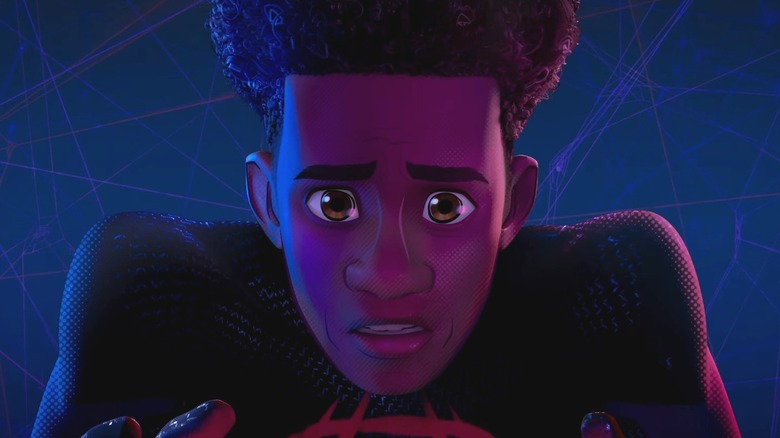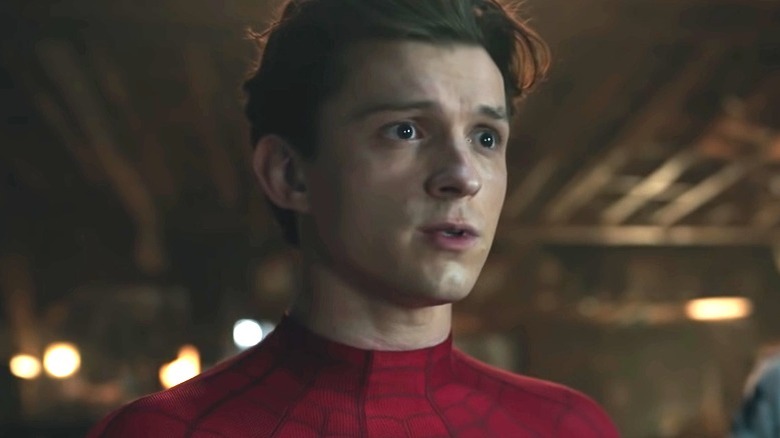Spider-Man: Across The Spider-Verse Has Us Looking Twice At No Way Home's Ending
This article contains spoilers for Spider-Man: Across the Spider-Verse
As much as "Spider-Man: Across the Spider-Verse" stands on its own merits, perhaps its greatest feat is how it recontextualizes pretty much every other "Spider-Man" adaptation that has come before it. Through the introduction of the idea of Canon Events, audiences learn that it's the wisecracking webhead's destiny to emerge as a valiant superhero and suffer grievous personal losses in just about every single universe. In fact, following the trend of major Spider-Man beats — a dead relative, a lost love, a sinister symbiote — is so important that any deviation will threaten to destabilize the entire universe.
There's a lot to unpack from this new chunk of lore, but it particularly has us looking back on another recent Spidey adventure in a whole new light: 2021's "Spider-Man: No Way Home." While that film doesn't directly mention the idea of canon events, it does deal with the idea of fate and adhering to the timeline. In fact, a lot of "No Way Home" falls directly in-line with what "Across the Spider-Verse" has revealed to us — which is what gives its ending, in which Tom Holland's Spider-Man manages to rewrite the destiny of his rogues' gallery from across the multiverse, such newfound significance.
Did MCU Spider-Man break the canon...
It's important to note that based on the information "Spider-Man: Across the Spider-Verse" provides to the audience about Canon Events, the idea of what is or isn't considered a Canon Event is still quite murky, and it hasn't been completely confirmed that Miguel O'Hara (Oscar Isaac) is revealing the full picture to Miles Morales (Shameik Moore). Nonetheless, "Spider-Man: No Way Home" does address pivotal, canon-defining moments from both the "Spider-Man" and "The Amazing Spider-Man" films — and it smashes through them with a hammer.
In the movie, it's established that Green Goblin (Willem Defoe), Doctor Octopus (Alfred Molina), Electro (Jamie Foxx), and the rest of the baddies that fell into the MCU from the multiverse are fated to die fighting Spider-Man in their respective universes. After all, that's exactly what audiences saw play out in those original movies, and Doctor Strange (Benedict Cumberbatch) is pretty adamant about the importance of not changing that outcome. Nonetheless, by the ending of "No Way Home," Holland's Peter is successfully able to cure the villains and save them from their deaths before sending them back to their home worlds.
"No Way Home" suggests that these villains get a happy ending through Spider-Man's multiverse interference, but there's no denying that their survival disrupts the canon of their original universes in a major way. If their deaths were taken as Canon Events, then per Miguel's explanation, the fabric of their worlds would likely crumble from their survival. Whatever the case, Spider-Man 2099 clearly isn't happy about what MCU Spidey did, seeing how he mentions as much early on in "Across the Spider-Verse."
...or does Miguel O'Hara have it all wrong?
So far, we've been operating on the idea that Miguel O'Hara's explanation of Canon Events in "Spider-Man: Across the Spider-Verse" is accurate. If it is, it potentially recontextualizes the ending of "Spider-Man: No Way Home" in a far more macabre light, with Tom Holland's Peter potentially dooming several alternate universes. However, what if we made some inverse observations? What if the fact that MCU Spidey breaks established canon at the end of "No Way Home" without multiverse-destroying consequences is a hint that what audiences are told about Canon Events isn't actually the whole truth?
"Across the Spider-Verse" already makes Miguel out to be a bit of a shady character with a rather nebulous backstory about deviating from the timeline. There are some small elements of his theory about Canon Events that stick out as rather odd, such as how Miles must adhere to these moments despite being an anomaly that was never supposed to be Spider-Man or how Earth-42 is intact despite its would-be Spidey having never existed. However, this reading of "No Way Home's" ending full-on suggests that Spider-Man 2099's theory on Canon Events is either way off-base, or he's knowingly misleading his counterparts.
Once again, it's important to emphasize that we're making some pretty big assumptions about how Canon Events work with this theory. Whether it ultimately holds water or not, "Spider-Man: Beyond the Spider-Verse" is set to deal with whether or not Miles really can disrupt the Canon Event of his father dying, so it's only a matter of time until some confirmation is reached either way.


